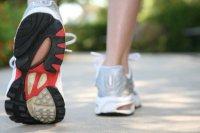 Running shoes that specialize in motion control may help control the risk of running injuries, according to a Luxembourg study. Those who run often and have flat feet or whose feet have a pronation, in which the feet rolled inward, benefited from motion control shoes. The study found that only those who had these particular conditions would be able to benefit from running shoes with motion control. Shoes that feature motion control had “a piece of plastic near the middle and a harder piece of foam on the inward side of the sole.” The study suggests that motion control can be more beneficial than shoes with no motion control.
Running shoes that specialize in motion control may help control the risk of running injuries, according to a Luxembourg study. Those who run often and have flat feet or whose feet have a pronation, in which the feet rolled inward, benefited from motion control shoes. The study found that only those who had these particular conditions would be able to benefit from running shoes with motion control. Shoes that feature motion control had “a piece of plastic near the middle and a harder piece of foam on the inward side of the sole.” The study suggests that motion control can be more beneficial than shoes with no motion control.
Runners can still be prone to running injuries even with proper precautions. If you are suffering from a running injury, contact Dr. Sharon Pletcher of Pennsylvania. Our doctor will diagnose and treat your foot and ankle needs.
How to Prevent Running Injuries
Many common running injuries are caused by overuse and overtraining. When the back of the kneecap starts wearing out and starts causing pain in your knee, this is commonly referred to as runner’s knee. Runner’s knee is a decrease in strength in your quadriceps and can occur if you’re not wearing properly fitted or supporting shoes. To prevent runner’s knee, focusing on hip strengthening is a good idea, as well as strengthening your quads to keep the kneecaps aligned.
What Are Some Causes of Running Injuries?
- One cause of a common running injury is called iliotibial band syndrome.
- Plantar fasciitis is also another common injury.
- Stress fractures can occur from overtraining, lack of calcium, or even your running style.
Best Ways to Prevent Running Injuries
- Wear footwear that fits properly and suits your running needs.
- Running shoes are the only protective gear that runners have to safeguard them from injury.
- Make a training schedule. Adding strengthening exercises as well as regular stretching can help keep you strong and limber and can lessen the possibility of injuries.
- Stretching keeps muscles limber, this will help you gain better flexibility.
If you have any questions please feel free to contact our office located in State College, PA. We offer the newest diagnostic tools and technologies to treat your foot and ankle needs.




